Health Correspondent, BBC Wales News
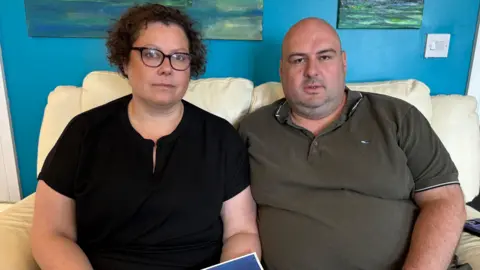 BBC
BBCA mother who played a key part in pushing for change in a health board’s maternity care said she felt vindicated following the publication of a report highlighting failures.
Sian Channon’s son Gethin was disabled due to failings made during his birth in 2019.
“It’s been a long journey for us, battling to get acknowledgement for what has been going on at Swansea. All the way up to Welsh government level we have been fighting.”
An assessment of all maternity services in Wales will now have an independent chair following the report.
The head of the Birth Trauma Association said it needed to take a thorough look at the culture of maternity units.
Mrs Channon said she and her husband Rob “have frequently been brushed off” and ignored, however they now feel the health board has listened.
She added that an unreserved apology “goes a long way to mend bridges with families who have felt adrift”.
Rob Channon added: “We do have faith that the new leadership want to make change, we just have to give them time.
“If they don’t make changes, we will have to hold them accountable for that.”
Maternity services across the UK have come under the spotlight, with the health secretary in England announcing “a rapid national investigation” into NHS maternity and neonatal services, following a series of maternity scandals going back more than a decade.
Those who support families that have experienced birth trauma argue the same mistakes were being made, with little sign that lessons were being learned.
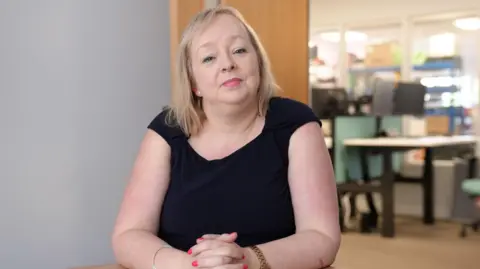
Julia Reynolds heads up legal firm Leigh Day in Wales, and as a medical negligence specialist said the issues had not changed in years.
“I see cases from all of the health boards across Wales and the issues we see are similar,” she said.
“I have significant concerns about the quality of maternity care across Wales.”
The review of care in Swansea found that debriefs with families and responses to complaints lacked compassion.
Ms Reynolds said after losing a baby many families struggle to deal with being told “it was one of those things”.
“While staff might feel they’re doing the right thing by potentially offering reassurance to families, what that really does is just leave those parents without answers, and really nagging doubts.”
“I do believe it’s a disservice to families and I think it’s really important for families to have answers, to understand what went wrong and even more importantly, for those children to get that early treatment to get the better outcome.”
The independent review into care at Swansea Bay included testimony from women who felt vulnerable, brushed off when they raised concerns, and as a result felt guilty for not speaking up for themselves more.
Bereaved women spoke of a lack of compassion, others felt belittled, and birthing partners felt powerless or ignored.
It called for improvements to the complaints process in Wales to make it less rigid and more compassionate.
Swansea Bay health board apologised unreservedly “to all women and families whose care has fallen well below the expected standard” and was working on an improvement plan.
The Welsh government also apologised, and accepted all recommendations in full.
Director of the Royal College of Midwives in Wales, Julie Richards, said the written policies, frameworks and statements from the Welsh government set out positive intentions.
“However, they cannot be achieved without investment and proper workforce planning.
“Over the past number of years reports and reviews into maternity services in Wales are sadly flagging the same key issues that are impacting the delivery of safe care, understaffing, underfunding, working culture and not enough emphasis or time for crucial multi-disciplinary training.
“Our members are seeing a rise in more complex pregnancies, with women requiring more specialist support during pregnancy so it’s never been more important to get this right.”
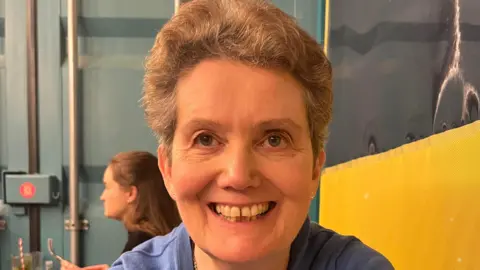 Kim Thomas
Kim ThomasA big theme from the report into care given in Swansea Bay was that women were not listened to.
“It’s very easy sometimes for staff to dismiss a woman who’s distressed as being over-dramatic,” said Kim Thomas, from the Birth Trauma Association.
“We hear quite a lot that women are told they’re making too much of a fuss. But when they try to remain calm there’s an assumption there’s probably nothing wrong.
“It creates real problems for women. This is where listening comes in – if a woman says she thinks something’s wrong, then actually listen to her.”
The issues were all the more pressing given the disparities experienced by black women across the UK.
Maternal mortality is almost four times higher than that of white women, with significant disparities for Asian and mixed ethnicity women too.
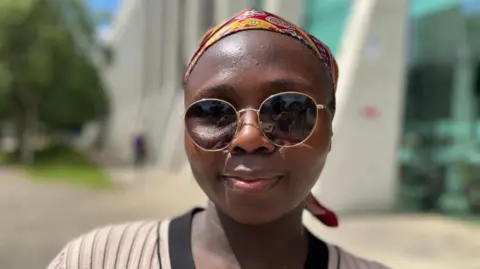
Umyima Sunday said she experienced good care when she delivered her second child at Singleton hospital two years ago, but her labour progressed so quickly she delivered her daughter on the ward.
“Even in pain, I’m really calm,” said the 33-year-old, who moved to Swansea from Nigeria to study a post-graduate course in public health three years ago.
“I would say they were looking at me thinking, ‘she’s not in so much pain’.
“But a woman that has gone through that before knows how her body reacts. They didn’t really understand that I was really in pain and needed them at that time.”
She said that while staff were listening, they lacked urgency, meaning no one was there to guide her through contractions and when to push.
“I just wanted the baby out and couldn’t think properly – if I had someone beside me, guiding me through the process, I would have avoided the tears I had during the process.”
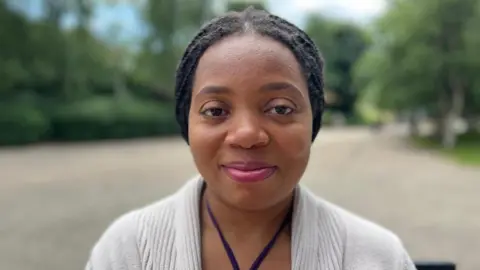
Perpetua Ugwu, 34, also considered her labour to be “smooth and straight forward” for her second child, and “nurses and midwives attended to me very well”.
Though she was initially told over the phone to “exercise a little bit of patience” when she told staff labour had started.
“If I had waited a little longer I would have given birth at home. If I hadn’t taken that step to go into the hospital I would have delivered at home, because they didn’t believe that my labour was there.
“But I knew what I was feeling and I knew that my labour is not long, it’s usually short.”
Her waters broke in the taxi to hospital and her baby was born around 30 minutes later.
She said if she could change one thing it would be to “take away that stereotype of black women being able to tolerate pain more.
“We all go through labour in different ways, but if someone complains she is feeling pain or not feeling well, the best they can do is give the person attention. Don’t let them wait a little longer.”
#Couple #feel #vindicated #critical #report #maternity #care



